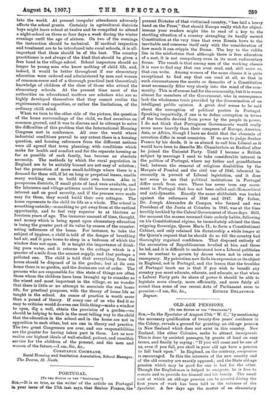PORTUGAL.
(To TRY EDITOR OF Tilt "SPECTATOR,1 SIR,—It is so true, as the writer of the article on Portugal in your issue of the 17th inst. says, that Senhor Franco, the
present Dictator of that victimised country, " has laid a heavy hand on the Press," that should Europe really wish for object- lessons your readers might like to read of a key to the startling situation of a country strangling its hardly earned Constitution at the very time that even Russia bows to the inevitable and concerns itself only with the consideration of how much it can cripple the Duma. The key to the riddle lies in the misfortune that although there is free education of a sort, it is not compulsory even in its most rudimentary forms. The result is that among men of the working classes it is rare to find any that can even read, and, still more so, that can write. Among women of the same classes it is quite exceptional to find any that can read at all, so that in such circumstances the merits or demerits of a Constitution must necessarily filter very slowly into the mind of the com- munity. This is of course bad for the community, but it is worse almost for members of the Government, who in consequence lack the wholesome tonic provided by the dissemination of an intelligent public opinion. A great deal seems to be said about the corruption of political parties in Portugal. Speaking impartially, if one is to define corruption in terms of the benefits derived from power by the people in power, I do not think that Portuguese Governments would really score more heavily than their compeers of Europe, America, Asia, or Africa, though I have no doubt that the channels of accretion differ in most countries. If we are to judge Senhor Franco by his deeds, it is as absurd to call him Liberal as it would have been to describe Mr. Chamberlain as Radical after he joined the Unionist Party. Until I became a British subject by marriage I used to take considerable interest in the politics of Portugal, where my father and grandfathers had, between the removal of religious disabilities by the Marquis of Pombal and the civil war of 1846, laboured in- cessantly in pursuit of Liberal legislation, and it does not seem to me that political institutions in Portugal differ much from ours. There has never been any move- ment in Portugal that has not been called anti-Monarchical and anti-dynastic. Exactly the same shibboleth was hurled against the reformers of 1846 and 1847. My father, Dr. Joseph Alexandre de Campos, who formed and was President of the Junta at Coimbra in 1846, was at the time terribly heckled by the Cabral Government of those days. Still, the moment the masses resumed their orderly habits, following on his Constitutional regime, he immediately advised the then reigning Sovereign, Queen Maria II., to form a Constitutional Cabinet, and only retained his dictatorship a while longer at the Queen's request that he should do so till the country had thoroughly regained confidence. That disposed entirely of the accusation of Republicanism levelled at him and those he led, and it is difficult to understand how a Liberal politician can be content to govern by decree when not in crisis or emergency. My patriotism now finds its expression or its object in England, not in Portugal, and the lesson that the troubles of Portugal teach me is that if you wish to benefit any country you must educate, educate, and educate, so that when a Labour Party gets its share of power it should be able to legislate more clearly, more efficiently, and more fairly all round than some of our recent Acts of Parliament seem to


































 Previous page
Previous page